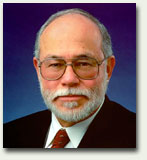
Colombia RPCV Dr. Refugio I. Rochin leaves Smithsonian Latino center
Former Carlsbad resident leaves Smithsonian Latino center
EDWARD SIFUENTES
Staff Writer
Some 40 years ago, Refugio Rochin left Carlsbad to join the Peace Corps as a volunteer. Today, he is one of the most widely recognized Latino scholars in the country.
After four years as founding director of the Smithsonian Center for Latino Initiatives, Rochin, an agricultural economist, left the Smithsonian this month to return to his "love" ---- social science research.
"I leave with the pride that comes with being the founding director of the center," Rochin, 61, said in an interview last week in Escondido. He added that he is proud of having helped to create the "door" that gave access to over 130 Latino scholars and experts in Latino studies.
The Smithsonian Institution is the world's largest museum and research complex, with 16 museums in Washington, D.C. and New York City, the National Zoological Park and seven research facilities in the country and overseas.
Under his tenure, the center also sponsored various exhibitions highlighting Latino art, culture and music in the United States.
Rochin is now a senior fellow at the Institute for Latino Studies at the University of Notre Dame and a senior associate for development at the National Hispanic Foundation for the Arts.
From humble beginnings, Rochin learned the value of his rich Latino heritage, he said. He was born in Colton. His father was an immigrant from Mexico and his mother was a Colton native.
The Rochin family moved to Carlsbad in the mid-1930s where they operated a restaurant and a wholesale business. He said each year around Christmas, his father would buy toys and candy to give to poor children in Tijuana.
At the time, he hated bagging the toys and candy, but when he saw the joy it brought to the children, he learned the value of his father's efforts.
During his time in the Peace Corps, he helped Colombian peasant farmers. He later studied farming development in Bangladesh and Pakistan under Nobel laureate Dr. Norman Borlaug.
Rochin earned a bachelor's degree in economics from the UC Berkeley, a master's degree in agricultural economics and anthropology from the University of Arizona and a doctorate in agricultural economics at Michigan State University.
During the 1970s, Rochin taught economics and co-founded the Chicano Studies Program at the UC Davis. He later held various administrative and research posts at the university.
While at the Smithsonian, the Center for Latino Initiatives sponsored Profiles of Excellence, an exhibition of photographic portraits of 100 outstanding Latinos recognized as the best in science, business, sports, music and other areas.
"These are 100 people that were chosen not just because they are the most famous or because they overcame tremendous odds," Rochin said of the exhibition, which included Cesar Chavez, Celia Cruz and others, "but because everyone recognizes that they are the very best in their fields."
Rochin's sister, Sylivia Rochin Selby, said Rochin, too, is a role model.
"There were always high expectations for him," Selby said. "But he never had any trouble meeting them. He is an absolute role model."
During his short stay in North County, Rochin said he planned to visit the barrio in Carlsbad and visit old friends, including Oceanside author Victor Villasenor.
Although he lives in Alexandria, Va., with his wife, Linda Rochin, he said visiting the area is like coming home.
Ofie Escobedo, a barrio Carlsbad activist, said people like Rochin are good role models for Latinos.
"We have a lot of people that have come out of the barrio that have done well in their lives," Escobedo said. "It's good now that they are now helping the Hispanic community and they are becoming role models."
Rochin said he does not rule out returning to live in the area, but he will continue to be an advocate for the Latino community wherever he lives.
"My desire is to continue my research and promotion of Hispanic contributions in the United States," he said.
Contact staff writer Edward Sifuentes at (760) 740-5426 or esifuentes@nctimes.com.
9/24/02
